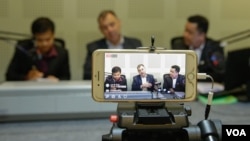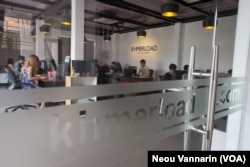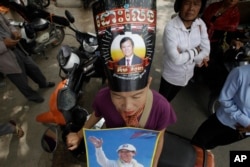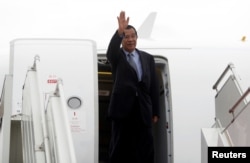Despite criticism from Washington over Cambodia's crackdown on the opposition and accusations that the U.S. helped plot Prime Minister Hun Sen's downfall, U.S. Ambassador William Heidt has said that America's support for Cambodia's economy will not be negatively impacted.
Heidt told VOA's Khmer service on Wednesday that the embassy's mission to strengthen the bilateral relationship with Cambodia remained of paramount importance.
"For me, the key next step is helping to connect Cambodia's technology sector with the big American technology companies, which are investing throughout Southeast Asia, mostly in Singapore and Ho Chi Minh City," he said.
"I think Cambodia is developing fast in technology, but it has not yet broken out of Cambodia, gotten a hook in with the regional technology network. And, that's what I am going to do next and I hope to do that in the first half of next year," he added.
Economic growth
The United States is focused on promoting Cambodian economic growth to connect U.S. investors with Cambodian technology companies, Heidt said.
The U.S. Embassy and Cambodian government have been at odds over accusations that Washington conspired with the opposition Cambodia National Rescue Party (CNRP) to overthrow Hun Sen in a so-called "color revolution" — a reference to attempts by pro-democracy movements to overthrow autocratic regimes in parts of the former Soviet Union, the Balkans and the Middle East.
The U.S. Embassy has denied allegations of interference.
Heidt said the allegations were categorically false.
"I don't spend a ton of time on this issue because there's really no more for us to say. And, I mean, nobody, nobody believes this in America. Nobody in our government, nobody in our society," he said. "We, on the American side, feel very strongly that we have been a great partner for Cambodia. We really helped Cambodia to develop in many ways and we want to keep doing that."
Hun Sen, one of China's closest regional allies, is a former Khmer Rouge officer who has ruled the southeast Asian country for more than three decades. He has intensified his rhetoric against the United States amid a crackdown on opponents and the media before next year's general election.
Earlier this month, Cambodia banned the opposition party after arresting its leader, Kem Sokha, and charging him with treason in September.
Heidt said he felt a deep regret at the government's decision to move to dissolve the CNRP, which has led the White House to reconsider its foreign relations with Cambodia. He said the Trump administration was reassessing Cambodia's eligibility for preferential trade agreements.
"Since I came here, let's be honest, the Cambodian government has taken a lot of steps against the government of the United States," he said. "They cut our military exercises, they threw [a] detachment out of the country, they made all of those accusations against us related to the political situation.
"I feel like there has never been an honest desire by the Khmer government to have a good relationship with the United States," Heidt added.
Some changes needed
Phay Siphan, government spokesman, said Phnom Penh did not desire to sour the relationship with the United States, but added that there were "some little activities" that needed to end in order for relations to improve, including suggesting Cambodia was "pro-China."
Hun Sen is in China — Cambodia's biggest donor and lender — this week for a Communist Party conference in Beijing, where he will meet Chinese President Xi Jinping.
Actions seen as anti-U.S. have included Hun Sen's request that the U.S. forgive a $505 million debt for food and agricultural goods. Cambodia's Lon Nol government borrowed the money in the 1970s, during its civil war with the Khmer Rouge. China wrote off debts incurred in the 1970s by the Khmer Rouge regime about 15 years ago.
In January, Phnom Penh suspended joint military exercises with the U.S., citing the local June elections as the cause, while rejecting suggestions that its decision was related to military and financial ties with China.
Most recently, after the U.S. announced on November 17 that it was ending funding for the upcoming election, the pro-government Fresh News website reported that Hun Sen said in a speech to garment workers that he welcomed the cut in U.S. aid, and urged Washington to cut all assistance.







